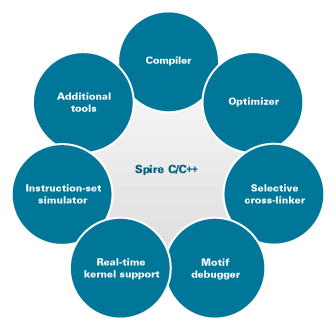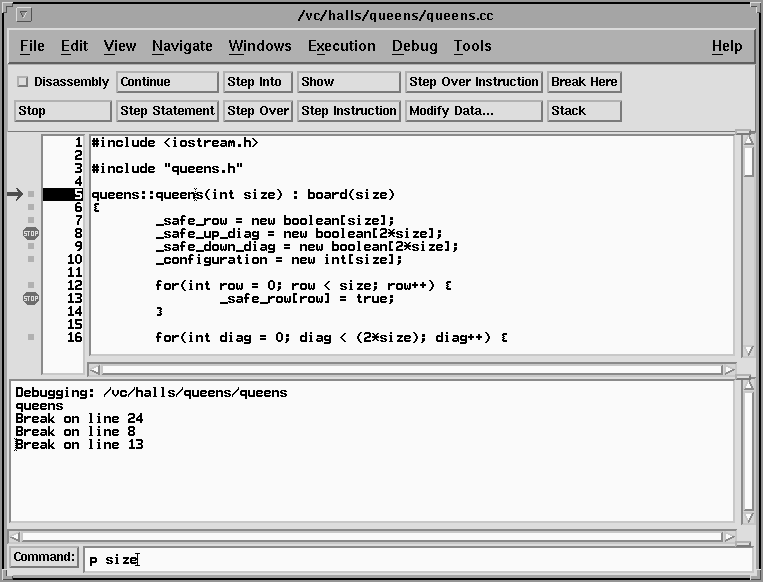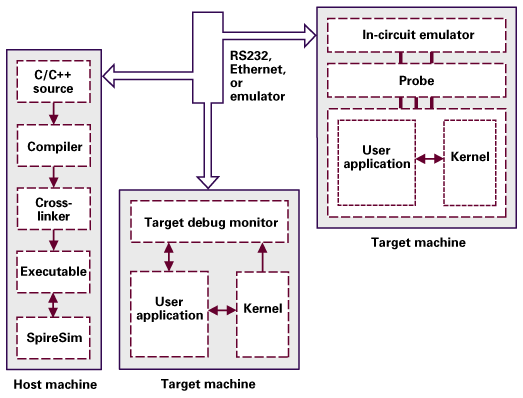Spire C/C++
Embedded systems solutions for complex C and C++
applications

- A solution for every embedded application need
- C only embedded applications
- C/C++ embedded applications
- C or C/C++ real-time applications
- Support for multiple embedded target processors, including:
- Motorola 68K and CPU-32 families
- PowerPC family
- MIPS R3000/R4000 family
- Intel x86 family
- Extensive support for demanding embedded applications
- Extremely powerful support for debugging
- Compact, high-performance executables
- Real-time performance capability
- A scalable solution for small projects or those with millions of
lines of code
- Common feature set and "look and feel" across all development
host platforms
- A solution that is easy to learn and use
- A proven, reliable technology
Rational's Spire(TM) family of C/C++ cross-development systems
consists of mature, production-quality, optimizing cross-compilers
and related tools to help you compile, debug, tune, and deliver your
application. Spire C/C++ is available for most popular embedded-systems targets. All Spire C/C++ cross-development systems are
built from a common code base, so they offer a common user
interface and common functionality across all host platforms and
embedded targets. Spire C/C++ products are fundamental components
of Rational's modern, software-engineering solution, comprising
software processes, integrated software-development tools, and
professional services. The complete Rational solution gives you
control of your software-development efforts and sharpens your
competitive edge.
Satisfies every C/C++ embedded and real-time application
need
Spire C/C++ provides comprehensive, easy-to-use support for host-to-target development of real-time embedded systems requiring the
use of C or C++. The Spire C/C++ family supports the proposed ANSI
C++ standard, ANSI C, and K&R C. Each member of the Spire family is
available in two forms: Spire C for projects using only C and Spire
C/C++ for projects mixing C and C++ or moving from C to C++. The
Spire C/C++ family includes all the tools needed for fast, efficient
cross development.
Brings you higher development productivity
Each Spire product includes--in addition to the cross-compiler--a
code optimizer, a Motif-based symbolic debugger, a disassembler, a
set of ANSI C and/or ANSI C++ standard libraries, and extensive
online help. Spire C/C++ also includes a compilation library manager
that helps you organize the components of a large program by
establishing multiple libraries based on your specific project needs.
The ANSI C and C++ libraries included in every Spire solution work
on top of SpireExec(TM) and other real-time kernels.
Optimizes your code for high performance
Spire C/C++ compilers are optimizing compilers that give you the
performance you need for demanding embedded applications. Each
Spire C/C++ compiler offers ten different user-selectable levels of
code optimization. Optimization techniques include:
- Code straightening
- Constant folding
- Copy, value, and range propagation
- Hoisting of loop-invariant code
- Elimination of common subexpressions and redundant branches
- Strength reduction on induction expressions
- Removal of dead variable assignments
- Sophisticated register allocation and management
- Peephole optimization
Spire C/C++ code generators for RISC architectures perform
additional instruction scheduling, and the code generators for all
architectures generate hardware floating-point instructions when
appropriate. Spire produces code that is fast, compact, and efficient.
It minimizes the size of your application and maximizes its
performance.
Reduces turnaround time and application size dramatically
Even though the Spire compilers are very fast, linking large
programs can be a bottleneck. To solve this problem, the Spire
cross-linker was designed to be fast, so you can quickly edit,
compile, link, and then test your code. For instance, Spire minimizes
object file symbolics to reduce the amount of work the linker must
do. The Spire cross-linker's selective linking capability, a
significant advantage, creates the smallest possible executable by
including only the subprograms and data your application requires.
This capability can be quite important when used in conjunction
with C++ development where class libraries can be very large.
Selective linking can effectively remove members not used in the
executable and make class libraries far more practical for embedded
systems.
Features flexible, complete download and board support
packages
Spire products come with a complete host-to-target, embedded-systems-oriented feature set to make your download-execute-debug
cycle easier. Different download communication options are
available to meet your specific needs, including coverage for
Ethernet, serial, emulator, simulator, or custom use. Sample
configurations for serial and Ethernet download are included in the
product.
Complete off-the-shelf board support packages (BSPs) are available
for some of the most popular boards for each microprocessor family.
Spire includes sample source code of the available BSPs if you need
to customize hardware support. And it's easy to integrate the
provided BSPs with your own compilation, linking, download, and
debug strategy.
Provides a high-performance real-time kernel option
Rational supplies an optional, compact real-time kernel called
SpireExec. It is an implementation of the POSIX
threads standard and is fully compliant with POSIX 1003.1c.
SpireExec supports real-time primitives such as mailboxes,
semaphores, interrupt service routines, and multiple programs to
give you more control over your real-time applications. SpireExec
offers flexible memory management, I/O support, timer support, and
support for intraprogram synchronization using POSIX threads. The
small, fast, and efficient SpireExec can be easily configured and
tailored to customized target systems. SpireExec is also ROMable
and scales in size according to the features required by your
application.
Supports your favorite off-the-shelf, third-party, real-time
solution
Spire C/C++ products can be used in conjunction with other real-time products. SpireWorks(TM) C/C++, a member of
the Spire family, supports Wind River System's VxWorks by handling
debugging of VxWorks real-time tasks. This operating-system-aware debug facility greatly enhances your ability to compile, link,
and debug real-time applications using the VxWorks operating
system. Real-time solutions from other vendors are planned in the
future. Contact Rational for further availability information.
Offers a powerful, nonintrusive debugger
Spire C/C++ products include a Motif-based windowing symbolic
debugger. Because the Spire debugger gets its symbolic information
from the compilation library instead of from your executables, you
can debug without recompiling.
The Spire debugger fully supports source-level and machine-level
debugging. Primary debugger features include:
- Full support for debugging C++ code
- View class objects
- Step into or over constructors, destructors, or inline code
- Break on exceptions
- Visit (browse) member functions from the source-code usage
- Support for character I/O from the target to the host using
printf/scanf functions
- File access from target to host disks
- Ability to call any function with user-entered parameters, which
is very useful for unit testing
- Minimally intrusive target debug monitor that does not impact
execution speed
- Single-stepping over instructions and over calls, including
display and navigation through the call stack
- Setting breakpoints at source-level statements, at instructions,
or at the beginnings of subprograms
- Ability to examine and modify the values of memory locations,
registers, and complex data structures
- Setting conditional breakpoints and specifying automatic actions
at breakpoints
The Spire debugger allows interactive subprogram calls and
character I/O from the target, so you can write and use
sophisticated debugging instrumentation subprograms. It provides
extensive command logging and scripting capabilities to automate
your debugging activities and make them reproducible. The debugger
understands all Spire runtime options, giving you a single,
consistent debugger model even if you use the additional real-time
mechanisms provided by SpireExec. Using the browsing capabilities
of the Spire debugger, you can quickly understand the behavior of
your program.

The Motif-based Spire C/C++ debugger is powerful, flexible, and easy to use.
Debugs optimized code
With Spire, you debug the fully optimized code that will run in your
fielded application. You never need to recompile your code with
optimizations turned off to use the debugger. You save time and have
increased confidence in your application because you can debug the
executable you will deploy.

The combination of Spire C/C++ and SpireSim allows testing on your host
and full support for developing for the target.
Debugs your embedded systems in real time
The Spire cross-compilers include the Spire debugger in cross-development mode to make it easy to test and debug embedded
systems. You download and debug directly from the host, choosing
the host-to-target communications link that best meets your
project's needs: RS232, Ethernet, or emulator. Because the target
debug monitor is a stand-alone, system-level debugging agent, you
can debug at the lowest levels--interrupt service routines or kernel
configuration code--not just at the application level. The Spire
symbolic debugger can also serve as the interface for your in-circuit
emulator. Trace buffers record signals from every buffer cycle out
of the CPU, so you can review the buffer and analyze the course of
debugging.
Provides multiplatform support
The entire Spire family is built from a shared base of source code.
The "look and feel," compiler details, debugger operations, interface
to the runtime executive, and most other product features are
identical for Spire on all platforms.
The hardware independence of Spire enables you to work on the
hardware of your choice, to share software among dissimilar
hardware systems, and to develop software programs on multiple
hosts. Source code, scripts, and makefiles are extremely
portable from one member of the Spire family to another. You can
change host or target hardware as your requirements change,
without changing your application code or retraining your
development team.
Brings you field-proven reliability
Code generation, debug, and runtime technologies in the Spire C/C++
compiler family have been successfully used for over ten years, both
in-house at Rational and on some of the world's most demanding
software projects. They have been proven on projects ranging from
thousands to millions of lines of code.
From the shipment of our first products over a decade ago, Rational
Software Corporation has focused on maximizing customer
productivity and providing the precision, scalability, and robustness
that programmers expect from their tools. Spire C/C++ reflects our
experience in supporting some of the largest, most sophisticated
applications worldwide. We have designed, refined, and expanded
Spire to implement features demanded by real-world programmers.
Spire meets the most stringent program needs, because we have paid
attention to the performance demands of our customers.
Works with other tools to provide a complete solution
Spire allows you to work with your favorite standard UNIX tools,
such as make, lex, yacc, and tags. It provides
messages suitable for either emacs or vi
editors. And the Spire
family also includes optional tools to give you an even more
complete development solution.
SpireAnalysis(TM) gives you nonintrusive coverage
analysis, performance profiling, and program tracing and debugging
capabilities to help you rapidly understand and tune your
application's behavior.
SpireSim(TM) provides efficient, instruction-level
simulation of major target architectures, allowing you to develop
and test your program on the host system even before your embedded
hardware is available. You can use the Spire debugger in concert
with SpireSim to analyze and debug your application as it runs on
the simulator, just as you would use the debugger on a program
running on the embedded hardware. SpireSim:
- Lets you develop and debug code before the hardware is available
or if hardware is a scarce resource
- Is less expensive than additional target hardware
- Loads target code very quickly (because it is actually host
memory) so the edit-compile-link-download cycle is faster for big
programs
- Provides an instruction-trace history to find the cause of
identified bugs
- Generates cache hit/miss counts to discover relative cache
usage
- Generates instruction-set statistics
Provides a scalable and upgradable path to Rational's
development environment products
Rational Apex(R) C/C++ combines a graphical user interface with
powerful development and code-management tools to provide an
unmatched environment to handle the most challenging C/C++
application-development projects. Rational Apex C/C++ helps
enforce your software architecture and control parallel development
by teams of software engineers, resulting in cost reduction,
minimization of risks, and improvement in the quality of your
software. And because Spire C/C++ products use the same front-end,
code generation, and debugger technology integral to Rational Apex
C/C++, the transition from the Spire cross-compilation system to
the full Rational Apex C/C++ environment is easy. You can start with
Spire C/C++ and grow into the Rational Apex C/C++ environment
when your project or staff begins to scale up.
Available development platforms
Spire C/C++ cross-compilers are available for popular host and
target platforms, including SPARC-based systems running SunOS or
Solaris, HP 9000 Series 700/800 systems running HP-UX, and Digital
Alpha AXP systems running Digital UNIX. Please contact your
Rational representative for an up-to-date list of other supported
platforms.
Multitarget processor support
The Spire C/C++ family supports most of the popular
microprocessors and microcontrollers on the market today.
68K family
- MC68020
- MC68EC020
- MC68030
- MC68EC030
- MC68040
- MC68EC040
- MC68LC040
- MC68060
CPU-32 family
- MC68330
- MC68331
- MC68332
- MC68333
- MC68340
- MC68360
MIPS R3000/R4000 family
- R3000
- R3001
- R3041
- R3051
- R3052
- R3081
- R3500
- R3800
- LR33000
- LR33020
- LR33050
- R4000
- R4200
- R4400
- R4600
PowerPC family
- 601
- 603
- 604
- 620
- (400, 500 series support planned*)
Intel x86 family
- (i386, i486, Pentium support planned*)
* Contact Rational for further availability information.

D-145; last updated 10/2/95



